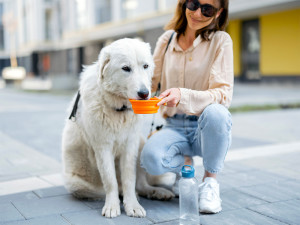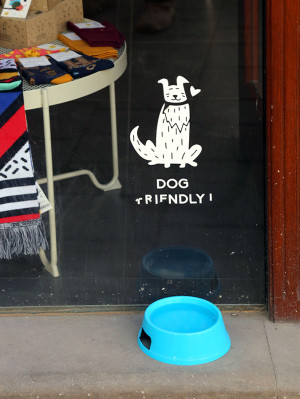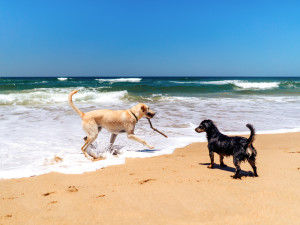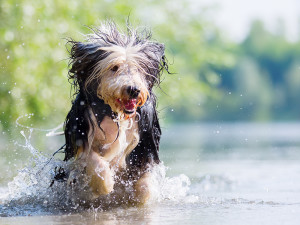What Can Dogs Drink Besides Water?
Good ol’ H2O should still be their top choice, but find out which alternatives are safe.

Share Article
In This Article:
What Can Dogs Drink Besides Water? Toxic Beverages Can Dogs Get Bored of Water? Fun Ways to Keep Your Dog Hydrated
Water is essential for keeping you and your dog healthy and hydrated. But when they get especially parched, you might wonder if there are other safe drink options available for your dog.
While water is by far the best and safest option for your pup, there are a few other liquids that can be given to them in moderation, with a couple of special considerations. Below, we discuss other beverages that can help add variety to your dog’s daily hydration routine.
What can dogs drink besides water?
If your dog is less than enthusiastic about filling up on water, you may try some of these safe options. Just use them in moderation — they shouldn’t be your dog’s only fluid source.

Whenever you are introducing a new treat, do so gradually, while monitoring for any signs of vomiting or diarrhea. It’s important to talk to your veterinarian before incorporating changes into your dog’s diet.
Bone broth
Homemade or store-bought bone broth can be a safe, nutritious option or treat for dogs. It is rich in nutrients, like amino acids, collagens, and glucosamine. Stick with broth that does not have any added salt, and avoid using products that contain onions, garlic, or other ingredients that can be toxic to dogs.
Pros:
Helps dogs maintain hydration
Added benefits such as immune, digestive, and joint support
Cons:
Can be high in salt or contain other dangerous seasonings
Can be difficult to store
Coconut water
Coconut water is safe for dogs in small amounts and can be a special treat, especially during the warmer months. Try freezing it with dog-safe fruits, such as apples, coconut, or blueberries, for a nutritious and refreshing summer pup-sicle. Avoid added sugars or flavors.
Pros:
Also contains electrolytes and many minerals
Offers a different taste that your dogs may enjoy
Cons:
Too much coconut water can cause digestive upset
Coconut water isn’t meant for dogs with certain health issues
Goat’s milk
Some dogs can tolerate goat’s milk in small amounts, because it tends to be lower in lactose than cow’s milk. Goat’s milk is a good source of protein and calcium. Offer small amounts first, just to make sure your dog doesn’t develop any gastrointestinal upset.
Pros:
A tasty alternative that also provides lots of other nutrients
Cons:
Some dogs won’t be able to tolerate goat’s milk, even in small amounts
Some dogs don’t need the extra calories
Safe fruit and vegetable juices
Plain, unsweetened fruit or vegetable juice can be given to your dog in small amounts as an occasional treat. Fruit juices can be very high in sugar, so we recommend only giving this on rare occasions.
Pros:
Your dog may really like the taste
There are lots of varieties to try
Cons:
It can be difficult to find low-sugar options
Avoid sugar-free versions that may contain xylitol
Beef or chicken broth
Beef or chicken broth can be added to your dog’s food as a topper. This can entice picky eaters to eat and provide flavor-enhancing goodness to their meals. Stick to low-sodium options, and avoid added ingredients such as garlic and onions, which can be toxic to dogs.
Pros:
Most dogs love the savory taste
Provides other nutrients that can promote immune, joint, and digestive health
Cons:
Can be high in sodium and contain other toxic seasonings
Pedialyte
If you’ve ever had a sick child, you know about Pedialyte. It’s a flavored electrolyte drink that helps maintain hydration when a child isn’t drinking enough water. Fortunately, it can also be given to dogs, especially ones who are sick. Just opt for a low-sugar variety and only offer it in moderation.
Pros:
Provides electrolytes as well as water
Offers a variety of flavors that your dog may enjoy
Cons:
Is fairly high in sugar, so you’ll want to limit the amount you offer
Don’t give sugar-free versions that may contain xylitol
Toxic beverages
These are some beverages that dogs must avoid, because they can be harmful or even toxic. If you believe your dog has ingested any of the below substances, it’s best to have them evaluated by a veterinarian.
Alcohol
Any alcoholic beverage, even in small amounts, can be extremely dangerous for dogs. This can cause intoxication, which can lead to vomiting and diarrhea, or more seriously, difficulty breathing, tremors, or even death.
Fruit juices containing grape
Not only are these juices high in sugar, but grapes can be toxic to dogs, resulting in kidney damage and death if left untreated.
Caffeinated beverages
Drinks such as tea, coffee, energy drinks, and caffeinated soda should be avoided because they are toxic to dogs. They can cause increases in their heart rate, restlessness, panting, and tremors.
Artificially sweetened drinks
Although it’s best your dog avoids sweetened drinks in general, this is especially true for drinks containing artificial sweeteners such as xylitol. This sugar substitute is often found in chewing gum, candies, and some peanut butter. It can cause low blood sugar secondary to insulin release, seizures, liver damage, and death.
Chocolate beverages
Any drinks containing chocolate should be avoided. They are also toxic to dogs.
Milk
Many dogs are lactose intolerant after being weaned, and can experience gastrointestinal upset such as vomiting, diarrhea, and flatulence. Although some dogs can tolerate milk in small quantities, it’s likely safest to avoid it.
Can dogs get bored of water?
While dogs don’t seem to mind eating the same dog food day in and day out, it doesn’t mean they can’t get a little tired of the same ol’ thing. The same goes for water, especially if that water isn’t clean or cool. They may seek out alternative sources of fluids, which could be dangerous. So, be sure to always provide fresh, clean, cool water and offer a bit of the safe options we talked about earlier if you want to up their hydration.
Fun ways to keep your dog hydrated
If your dog is lagging in the water-drinking department, trying some of the following things may help up their hydration game.
Ice cubes
Most dogs love a good game, and what’s more fun than chasing around a slippery, cool treat? Adding ice cubes to their water can get them to drink more, because they see it more as a game than a strategy to boost their health. You can also freeze bone broth or coconut milk into cubes for additional fun frozen treats.
Wet food
Wet, or canned, food contains more water than dry kibble. Plus, it tends to be a bit tastier. So if your dog isn’t getting enough water, giving them some wet food can help.
Water fountain
Doggie water fountains provide a couple of benefits. They’re intriguing, often getting a dog to drink more just because they are curious. And they filter the water as it goes through to make sure your dog is getting the cleanest option possible.
Change water daily
Alright, this one might not necessarily be fun, but it’s very important. Dump your dog’s water bowl daily — and clean the bowl — to reduce any adverse tastes or odors that your dog may not like.
Bottom line
Water is an essential part of a dog’s daily intake, but they may not be getting enough.
If you’re worried about the amount of fluids that your dog is getting, try enticing them with some of the safe alternatives discussed, above.
Not all liquids are safe for a dog to drink, so talk to your veterinarian if you have any questions.
FAQs
Can dogs drink orange juice?
Dogs can tolerate fresh-squeezed orange juice in small quantities as a special treat, but it is not an ideal drink for them. The high acidity in orange juice may upset a dog’s stomach, leading to discomfort or vomiting. Orange juice is also high in natural sugars, which is not the best option for dogs.
Can dogs drink almond milk?
Although almond milk is non-toxic to dogs, it does not provide significant nutritional benefits for dogs, either. Some sweeteners or gums and additives seen in many commercial almond milk brands or other alternative milk products can also cause your dog to have an upset stomach. I
f you’re looking for a milk option for your dog, consider goat’s milk in small amounts. Some dogs can tolerate cow’s milk in smaller quantities as well.
Can dogs drink bone broth?
Yes, bone broths are great options for your dog and provide important nutrients such as collagen, glucosamine, and amino acids. Bone broth can be a nice food topper to appease picky eaters, or as an occasional treat. It is best to stick with low-sodium options and avoid broths with onions and garlic, which can be toxic to dogs.
Can dogs drink Gatorade?
Gatorade tends to be very high in sugar, which can cause digestive issues in dogs. If you are looking for an alternative to water that also carries an electrolyte punch, look to Pedialyte or the low-sugar versions of Gatorade. Even then, only feed them to your dog in moderation.

Dr. Chyrle Bonk, DVM
Dr. Chyrle Bonk has been a mixed-animal veterinarian since 2010, with a special interest in rehabilitation. When she's not practicing or writing about veterinary medicine, you may find her exploring the outdoors with her family or tending to her cows, horses, chickens, or cats and dogs.

Dr. Gabrielle Fadl, DVM
After graduating from Kansas State University College of Veterinary Medicine, Dr. Fadl returned to the New York area to pursue a one-year rotating internship and has been working in general practice since. Dr. Fadl loves working in the pet space to foster the powerful human-animal bond. She hopes to continually learn and grow to practice the best quality medicine. Her motto is “Keep calm and try to take it as it comes.”
Related articles
![Labrador Retriever and Dachsund playing with a stick at the beach shoreline]()
Summer Is Heating Up. Here Are 6 Ways to Keep Your Dog From Doing the Same
Pro tips to keep your pup safe, happy, and exercised during the warmer months.
![A woman sitting in a chair holding a dogs paw in her hand and holding the dogs face in the other hand.]()
6 Natural Paw Balms That Will Keep Your Pup Safe From Summer Heat
The best paw balms, based on veterinarian recommendations.
![Woman holding a beagle in warm dappled summer light]()
You’ve Got a Summer-Lovin’ Pup. Here’s How to Keep Them Safe
Some like it hot (but not most dogs). Here are the season’s health hazards, from fleas to foxtails.
![Owner and their dog outside in the summer.]()
It’s Hot Out There—Here’s How to Protect Your Pup’s Paws
Those perfect little toe beans need all the help they can get.
![Bearded Collie running in a lake]()
When Drinking Too Much Water Is Deadly
How to keep your swim fan safe.








